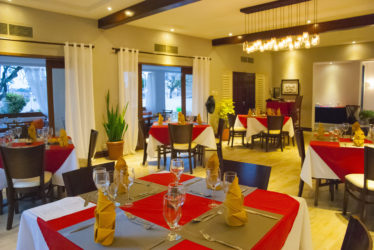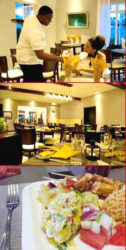Michael and Dee George, the proprietors of the Herdmanston Lodge are big fans of the Restaurant Week event not just because it allows their kitchen a special occasion on which to parade its talents but also it represents an occasion for Guyanese to eat out.
In the latter respect, Michael says, the event is making an impact. People who, in the past, never customarily ventured beyond the culinary offerings of their own kitchens are beginning to venture out.

That, the Georges say, is a challenge to the ability of local restaurants to “sell themselves.” They believe that Restaurant Week is about much more than offering good food. It is about selling a service.
Dee credits the Tourism and Hospitality Association of Guyana (THAG), and particularly its former President Sean McGrath with introducing Restaurant Week. She gives the impression that the whole idea behind the event came out of a period when THAG had immersed itself in an intense interlude of invention, a period dedicated to finding new ways of promoting the local tourism and hospitality sector.
Far from being simply a reason for local restaurants to sell more food, Restaurant Week is a structured event, conditioned by limited rules that include prior agreement among the participants to offer lunch and dinner at a pre-agreed price.
Beyond participating restaurants, other business houses have been ‘sold’ on the idea of participating. As Michael explains wines and spirits establishments ‘chip in,’ providing their products at ‘knock down’ prices so the

participating restaurants can offer a complete meal.
At the Herdmanston Lodge you get the feeling that in their own unfussy way, the Georges already have the arrangements for Restaurant Week ‘done and dusted’ and they are anticipating what, over the years, has been the customary surge in bookings for the period. Both Michael and Dee see the significance of Restaurant Week as reposing in the role it plays in strengthening the practice of ‘eating out’ as part of the Guyanese culture.
When you engage them you are left with little doubt that theirs is an altogether uncontrived partnership. Michael recognizes and spent time acknowledging the image-enhancing role which Dee contributes to the establishment. The impressiveness of their teamwork is exemplified in how well they appear to complement each other in their responses to questions about the future of their entrepreneurial pursuits.
Michael says that by investing in “good help,” people who are skilled in and dedicated to providing the Herdmanston Lodge with the standards which the owners demand, what they have in effect done is to free themselves up to think growth and expansion. Michael says real estate is a focal business interest though they both concede that the satisfaction they have derived from the role which the restaurant and the 24-room Herdmanston Hotel have played in raising standards in the service sector has been enough to cause them to want to expand those services.
This week, it seemed like some of the Stabroek Business’ earlier engagements with Michael during his sojourn as Director of Sales & Marketing at the Guyana Telephone and Telegraph Company was light years away. At Herdmanston Lodge he holds no official position, valuing much more, he says, the prerogative of playing the broader brains-thrust role. In that capacity he engaged us earlier this week with the same incisiveness, the same intensity of a decade ago; except that this time he gave more of himself, conceding his passion for Guyana and for aggressively pursuing the opportunities which he says exist under our noses. Nor is he reluctant in his role as a businessman to articulate his views on the respective roles of government and the private sector in taking the economy and the country forward.
What he finds troubling, he says, is what he believes to be a disturbing and potentially destabilizing dichotomy between the rhetoric of the private sector being the “engine of growth” and what often appears to be, in reality, government domination of the entire landscape. “That has to change,” George says. “It is time that we left the clichés behind. There is need for a link between the rhetoric and the reality and I believe that there is greater need for more support for the private sector.”





